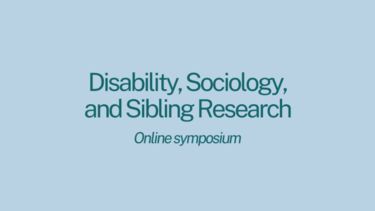Online Symposium: Disability, Sociology, and Sibling Research

Event details
Description
Please join us for an online symposium entitled Disability, Sociology, and Sibling Research. Psychological studies continue to dominate sibling and disability research. The importance of bringing in sociological perspectives to this research area cannot be underestimated. Structural factors, such as poverty and deprivation, so often predict the mental health outcomes of individuals, including the siblings of disabled people. Sociological approaches also support our thinking around the ways that disabled people, siblings, and families, are inextricably interconnected. This connection is almost antithetical to the often hyper-individualistic approach of psychology.
Societal attitudes towards disabled people and carers, and the ableism and discrimination that disabled people face, all contribute to the experiences of siblings and families. These important aspects cannot be fully understood by psychology alone. This symposium brings together expert researchers to discuss the important contributions of sociology to our understanding of the experiences of siblings of disabled people. Our series of talks and speakers include:
- Dr Shaquinta Richardson – Intersectional identities: Siblings, disability, race, and gender
- Tom Ryan – Siblinghood and learning disability: Using humour to counter deficit narratives
- Dr Georgia Pavlopoulou – An experience sensitive approach to understanding siblings
- Dr Ariella Meltzer – Sociology, disability, and sibling relationships
The symposium chairs are Dr Nikita Hayden and Dr Katherine Davies.
The event will be held on Wednesday 13th March 2024, on Google Meet. Time zones: 7.00-8.30pm GMT; 6.00-7.30am AEDT; 2.00-3.30pm CT.
You can download the full symposium information here. Sign up to the event here. Please send any queries to Dr Nikita Hayden – n.hayden@sheffield.ac.uk

Our work
How we understand being ‘human’ differs between disciplines and has changed radically over time. We are living in an age marked by rapid growth in knowledge about the human body and brain, and new technologies with the potential to change them.